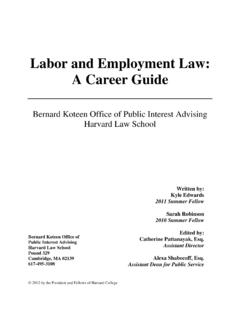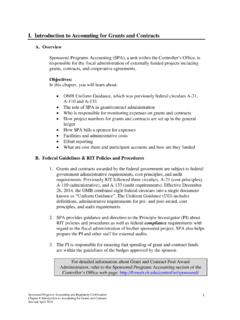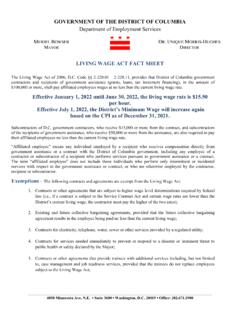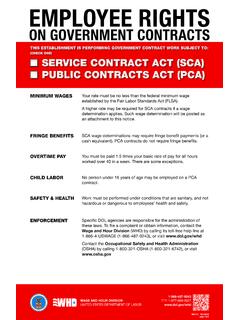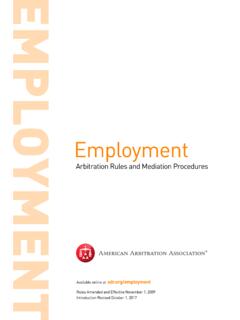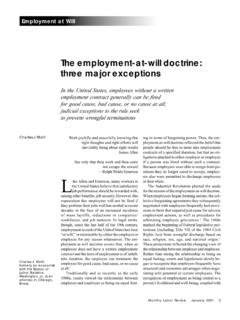Transcription of Labour and Employment Law in British Columbia - BLG
1 Labour &. Employment Law in British Columbia A Practical Guide 2018. Table of Contents 1 Introduction 44 Equal Opportunity / Affirmative Action Programs 3 Employment Contracts 45 Whistleblower Protection 7 Pre- Employment Testing 46 Sexual and Other Forms of 11 Employee Deductions / Employer Harassment Contributions 47 Pay Equity 13 Social Insurance Card 48 Workers' Compensation and 14 Minimum Employment Standards Occupational Health & Safety 26 Dismissal Without Just Cause 52 Private Pension Plans 30 Labour Climate in British Columbia 55 Medical Services Plan 32 Union Certification 56 Construction Industry 38 Decertification 57 Successor Rights and Obligations 39 Human Rights Code 59 Elections and Voting
2 42 Privacy and Protection of 61 Work Permits for Foreign Nationals Personal Information The information contained herein is of a general nature and is not intended to constitute legal advice, a complete statement of the law, or an opinion on any subject. No one should act upon it or refrain from acting without a thorough examination of the law after the facts of a specific situation are considered. You are urged to consult your legal adviser in cases of specific questions or concerns. BLG does not warrant or guarantee the accuracy, currency or completeness of this publication. No part of this publication may be reproduced without prior written permission of Borden Ladner Gervais LLP.
3 If this publication was sent to you by BLG and you do not wish to receive further publications from BLG, you may ask to remove your contact information from our mailing lists by emailing or manage your subscription preferences at If you feel you have received this message in error please contact BLG's privacy policy for publications may be found at 2018 Borden Ladner Gervais LLP. Borden Ladner Gervais is an Ontario Limited Liability Partnership. Labour & Employment Law in British Columbia : A Practical Guide | 1. Introduction In British Columbia as in other Canadian provinces, laws dealing with Employment matters come within the jurisdiction of the local legislature (called the Legislative Assembly of British Columbia ), except where Employment in a work or undertaking falls within one of the heads of federal legislative power of the Parliament of Canada.
4 The latter include aeronautics, shipping and navigation, longshoring (stevedoring) activities, national railways, banking, inter-provincial and international bus and transport companies, radio and television broadcasting, cable TV and other forms of telecommunications, operations which are declared to be for the general advantage of Canada or two or more provinces (such as grain elevators and nuclear facilities) and any other business which is an integral and essential part of a federal work or undertaking. The federal Parliament has exclusive jurisdiction over Employment insurance benefits and bankruptcy, whereas workers' compensation is a provincial matter.
5 2. Distinct federal and provincial legislation and regulations exist governing minimum Employment and Labour standards, collective bargaining, occupational health and safety, human rights, collective dismissal, pay equity, protection of personal information, pension plans and successor rights and obligations, all of which provisions apply separately to federally and provincially-regulated employers. Since this document provides only an overview of British Columbia 's provincial legislation and regulations, employers operating in British Columbia , or contemplating carrying on business in British Columbia , should consult with their professional advisors to determine their specific rights and obligations under applicable statutes and regulations.
6 Employers falling under federal jurisdiction should exercise particular care, as many of the statutes and regulations reviewed in this paper do not apply to them. Labour & Employment Law in British Columbia : A Practical Guide | 3. Employment Contracts Written contract ? If so, for What Level of Employee? It is by no means necessary to use a written Employment contract when hiring in British Columbia : a contract of Employment may be oral or in writing. However, there can be certain advantages to using written contracts. Written contracts of Employment are more commonly used in hiring managers or executives, individuals in key positions, individuals handling confidential information and employees hired for a particular term or task.
7 They are also often used when an employer wishes to deal with the issue of termination arrangements directly, as opposed to leaving it to the courts. The starting point is a consideration of the position the parties will be in if no written contract exists. In an oral contract , the terms of Employment consist of those matters expressly agreed to and those terms implied by law. Express terms agreed to by the parties may include hours of work, rate of pay, benefits, vacations, and bonuses. Implied terms are those that are not discussed but that any reasonable person would understand to be in the contract . Implied terms include the employer's obligation to pay the employee and the employee's obligation to work to the best of his or her abilities.
8 Since British 4. Columbia does not recognize the at-will principle used in the United States, an implied term in all Employment contracts is that the employer must provide the employee with reasonable advance notice or, instead, a payment in lieu of notice in the event of dismissal without just cause, except with fixed term contracts when the Employment terminates upon expiry of the fixed term. It is also common for an Employment contract to contain many terms that are referenced in writing without the parties specifically entering into a formal written agreement. For example, an offer of Employment may be in a letter setting out salary, benefits, start date, title, and job duties.
9 The employee may be given a handbook that details insured benefit plans and employer policies or rules governing probationary period, absences, safety, discipline, and so forth. The important question for employers is when does a more formal written contract become advisable? The employer's objective in using a formal written contract , besides certainty of terms, is usually either to establish the notice or pay in lieu of notice period owed upon termination without cause; to shore up confidentiality, non-solicitation, and non-competition covenants; or to introduce specific contractual terms considered particularly important to the position.
10 The following are examples of situations where written contracts of Employment are commonly considered warranted by employers in British Columbia . Fixed Term or Task The statutory obligation to give notice of termination, discussed in the Employment standards section of this document, can be avoided by hiring on a fixed-term or task basis, provided the employee is not terminated without cause prior to the end of the fixed-term or defined task. Hiring for a specific task, such as the completion of a software installation or for a specific term such as the busy retail holiday season, may also protect the employer from being held liable for the reasonable notice requirement if the task is finite and well defined.



